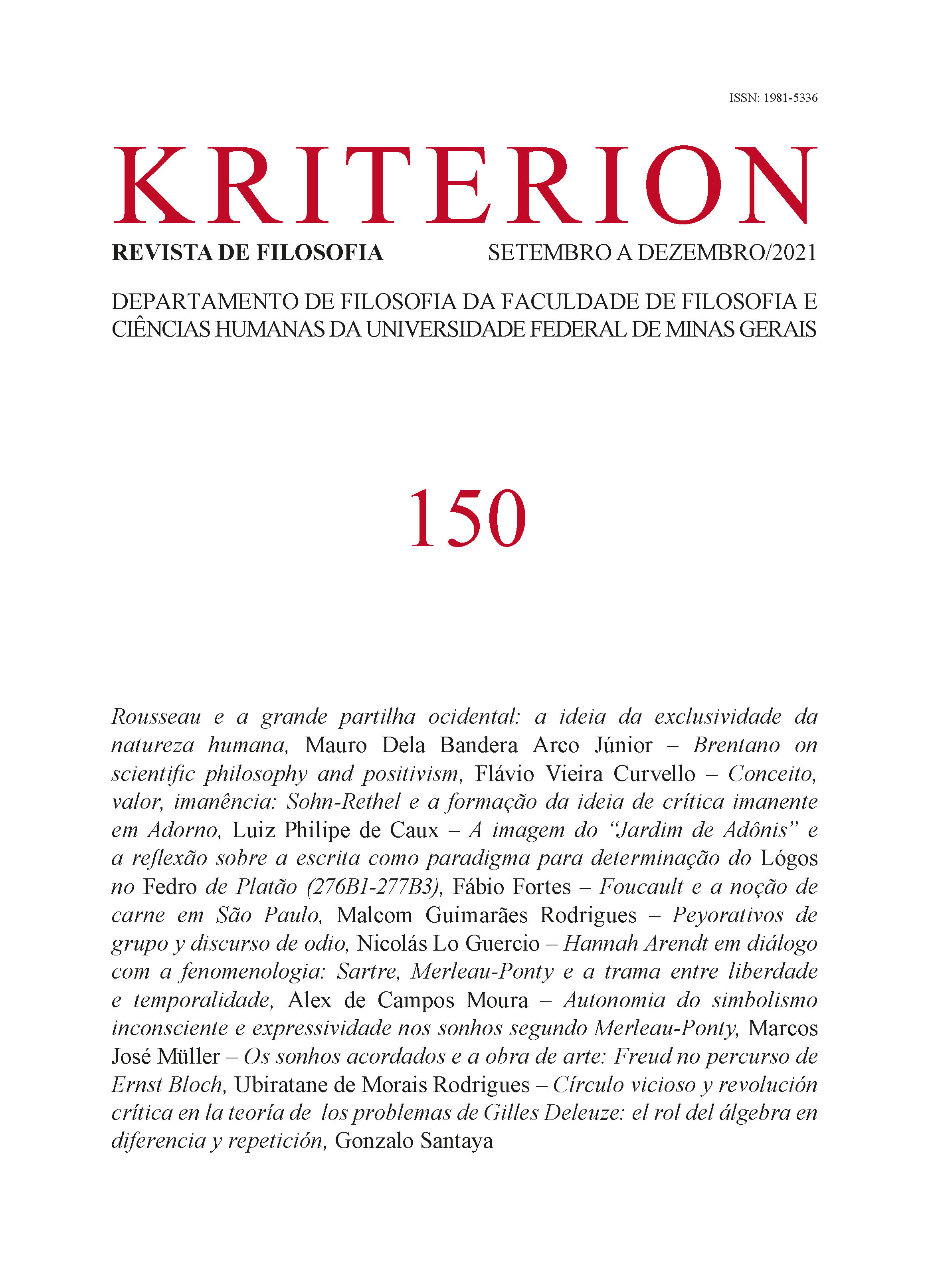BRENTANO SOBRE FILOSOFIA CIENTÍFICA E POSITIVISMO
Palavras-chave:
Teoria do Conhecimento, Positivismo, Ciências Naturais, Ciências Humanas, PsicologiaResumo
No presente artigo eu analiso a quarta tese de habilitação de Brentano, de acordo com a qual o método da Filosofia tem de ser aquele da ciência natural. O sentido desta tese pode ser abordado inicialmente através de um exame da perspectiva de Brentano acerca da relação entre as ciências humanas e naturais. Seus argumentos em favor de uma unidade metodológica neste debate mostram que ele está efetivamente argumentando por uma ideia omni-abrangente de conhecimento científico, que não pode ser restrita aos campos já reconhecidos como científicos, mas que pode também ser aplicada ao domínio filosófico. Uma compreensão mais robusta dessa ideia é oferecida pelos escritos de Brentano acerca do positivismo de Comte.
Referências
BAUMGARTNER, W. “Le contenu et la méthode des philosophies de Franz Brentano et Carl Stumpf.” Les études philosophiques, Vol. 1, pp. 3-22, 2003.
BINDER, T. “Franz Brentano: Life and Work”. In: KRIEGEL, U. (ed.) The Routledge Handbook of Franz Brentano and the Brentano School. New York: Routledge, 2017. pp. 15-20.
BLACKMORE, J. “Franz Brentano and the University of Vienna Philosophical Society 1888-1938”. In: POLI, R. (ed). The Brentano Puzzle. Vermont: Ashgate Publishing Company, 1998. pp. 73-91.
BRENTANO, F. “Auguste Comte und die positive Philosophie”. Erster Artikel. Chilianeum Blätter für katholische Wissenschaft, Kunst und Leben, Vol. 2, 1869.
_____. “Auguste Comte und die positive Philosophie”. In: HEDWIG, K. (ed.) Geschichte der Philosophie der Neuzeit. Hamburg: Felix Meiner, 1987. pp. 246-294.
_____. “Deskriptive Psychologie”. Hamburg: Felix Meiner, 1982.
_____. “Die Gesetze der Wechselwirkung der Naturkräfte und ihre Bedeutung für die Metaphysik”. Brentano Studien, Vol. 14, pp. 27-56, 2016.
_____. “Meine letzten Wünsche für Österreich.” Stuttgart: Cotta Verlag, 1895.
_____. “Nieder mit den Vorurteilen! Ein Mahnwort an die Gegenwart, im Geiste von Bacon und Descartes von allem blinden Apriori sich loszusagen”. In: KASTIL, A. (ed.), Versuch über die Erkenntnis. Hamburg: Felix Meiner, 1970. pp. 3-113.
_____. “Psychologie vom empirischen Standpunkte”. Leipzig: Duncker & Humblot, 1874.
_____. “Über die Zukunft der Philosophie”. Hamburg: Felix Meiner, 1968.
COMTE, A. “Cours de philosophie positive”. Tome premier. Paris: Rouen Frères, 1830.
_____. “Discours sur l’esprit positif”. Paris: Carilian-Goeury et von Dalmont, 1844.
FISETTE, D. “Franz Brentano and Auguste Comte’s positive philosophy”. Brentano Studien, Vol. 16, pp. 73–110, 2018.
_____. “Introduction: Franz Brentano in Vienna”. In: FISETTE, D. FRÉCHETTE, G. STADLER, F. (eds.) Franz Brentano and Austrian Philosophy. Vienna Circle Institute Yearbook. New York: Springer Verlag. Forthcoming.
GILSON, L. “Science et philosophie selon F. Brentano”. Revue Internationale de Philosophie, Vol. 20 (78 - 4), pp. 416-433, 1966.
HALLER, R. “Franz Brentano, ein Philosoph des Empirismus”. Brentano-Studien, Vol. 2, 19-30, 1988.
HEDWIG, K. “Anmerkungen des Herausgegebers”. In: In: HEDWIG, K. (ed.) Geschichte der Philosophie der Neuzeit. Hamburg: Felix Meiner, 1987. pp. 299-372.
HUSSERL, E. “Erinnerungen an Franz Brentano”. In: NENON, T. SEPP, H. R. (eds.), Aufsätze und Vorträge (1911-1921). Dordrecht: Martinus Nijhoff, 1987. pp. 304-315
HUEMER, W. “Vera philosophiae methodus nulla alia nisi scientiae naturalis est. Brentano’s conception of philosophy as rigorous science.” Brentano Studien, Vol. 16, pp. 53-72, 2018,.
IERNA, C. “Brentano and mathematics”. In: TĂNĂSESCU, I. (ed.) Franz Brentano’s metaphysics and psychology. Bucarest: Zeta Books, 2012. pp. 338-396.
_____. “La science de la conscience selon Brentano”. In: C. NIVELEAU (ed.) Vers une philosophie scientifique: Le programme de Brentano. Paris: Demopolis, 2014a. [Online] Available on: http://books.openedition.org/demopolis/108 (Accessed on: 18th August 2020).
_____. “Making the humanities scientific. Brentano’s project of philosophy as a science”. In: BOD, R., MAAT, J. WESTSTEIJN, T. (eds.), The making of humanities, vol. 3. The modern humanities. Amsterdam: Amsterdam University Press, 2014b. pp. 543-554.
INGARDEN, R. “Le concept de philosophie chez Franz Brentano”. Archives de Philosophie, Vol. 32, N. 3, pp. 458-475, 1969.
KASTIL, A. “Die Philosophie Franz Brentanos. Eine Einführung in seine Lehre”. Bern: A. Francke AG, 1951.
KRAUS, O. “Anmerkungen des Herausgegebers”. In: KRAUS, O. (ed.), Über die Zukunft der Philosophie. Hamburg: Felix Meiner, 1968. pp. 145-183.
MÜNCH, D. “Brentano and Comte”. Grazer Philosophische Studien, Vol. 35, pp. 33-54, 1989.
SAVU, B. “A sketch of the notion of decline in Auguste Comte. Common points with the corresponding Brentanian notion.” Analele Universităţii din Craiova, Seria Filosofie, Vol. 43, N. 1, pp. 46-67, 2019.
SCHAEFER, R. “The Madness of Franz Brentano: Religion, Secularisation and the History of Philosophy”. History of European Ideas, Vol. 39, N. 4, pp. 541-560, 2013.
SCHMIT, R. “Brentano et le positivisme”. Archives de Philosophie, Vol. 65, N. 2, pp. 291-309, 2002.
SIMONS, P. “The four phases of philosophy: Brentano’s theory and Austria’s history”. The Monist, Vol. 83, N. 1, pp. 68-88, 2000.
SPIEGELBERG, H. “The phenomenological movement. A historical introduction”, vol. 1. Den Haag: Marinus Nijhoff, 1965.
_____. “Phenomenology in Psychology and Psychiatry. A historical introduction”. Evanston: Northwestern University Press, 1972.
STUMPF, C. “Erinnerungen an Franz Brentano”. In: KRAUS, O. (ed.), Franz Brentano. Zur Kenntnis seines Lebens und seiner Lehre. München: C.H. Becksche Verlagsbuchhandlung, 1919. pp. 87-149.
_____. “Selbstdarstellung”. In: SCHMIDT, R. (ed.), Philosophie der Gegenwart in Selbstdarstellungen. Leipzig: Felix Meiner Verlag, 1924. pp. 205-265.
TĂNĂSESCU, I. “Brentano – Comte – Mill: The Idea of Philosophy and Psychology as Science”. Forthcoming.
TĂNĂSESCU, I. “Die Phasentheorie. Franz Brentano und Auguste Comte.” Brentano-Studien, Vol. 15, N. 1, pp. 335-366, 2017.
TATARKIEWICZ, W. “Nineteenth century philosophy” Translation from C.A. Kisiel. Belmont: Wadsworth Publishing Company, 1973.
VOLPI, F. “War Franz Brentano ein Aristoteliker? Zu Brentanos und Aristoteles Konzeption der Psychologie als Wissenschaft.” Brentano-Studien, Vol. 2, pp. 13-29, 1989.
WERLE, J. M. “Franz Brentano und seine Schüler. Aspekte fruchtbarer und problematischer Beziehungen”. Brentano-Studien, Vol. 2, pp. 91-101, 1989.
WILLARD, D. “Who needs Brentano? The wasteland of philosophy without its past”. In: POLI, R. (ed.), The Brentano Puzzle. Vermont: Ashgate Publishing Company. Western Philosophy Series, 1998. pp. 15-43.
Downloads
Publicado
Edição
Seção
Licença
Copyright (c) 2021 Revista Kriterion

Este trabalho está licenciado sob uma licença Creative Commons Attribution 4.0 International License.










